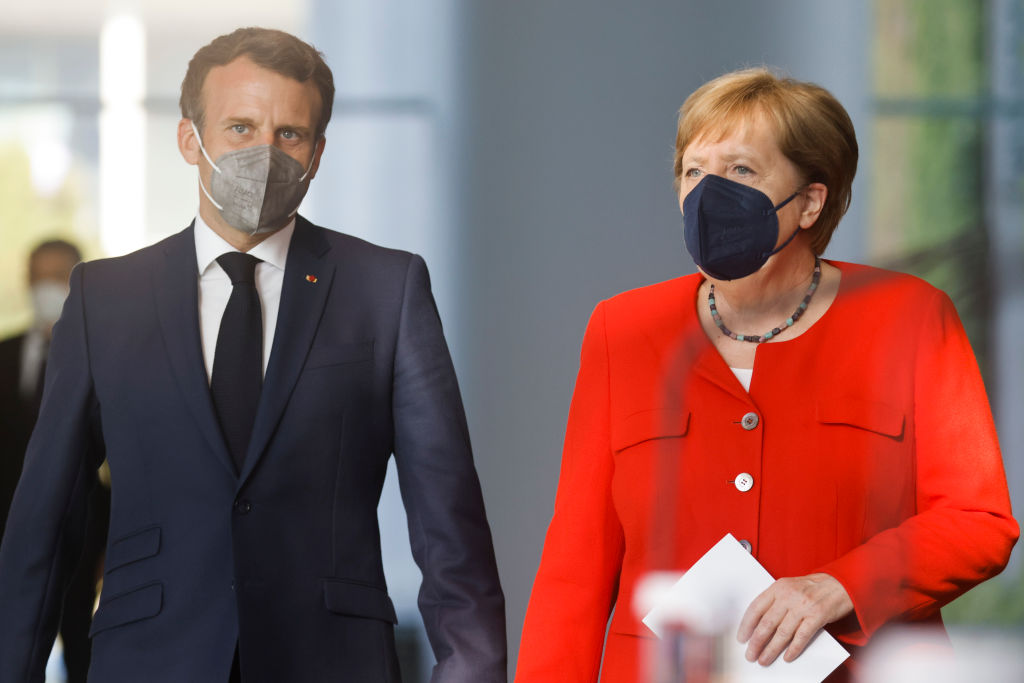When Emmanuel Macron and Angela Merkel unilaterally proposed a European Union summit with Vladimir Putin, they managed to open deep fault lines in the continent over the EU’s Russia policy. Soon afterwards, Macron and Merkel were forced into an embarrassing reversal, largely by the countries of Central Europe, and had to cancel the proposed summit. In the process the two world leaders highlighted that this was not the right time for a summit, that the EU is divided over Russia, and that this kind of initiative plays into Russia’s misunderstanding of the Union.
The suspicion must be that Macron and Merkel wanted to emulate the success of Joseph Biden’s recent meeting with Putin. It certainly did not seem like they had a specific and sensible agenda in mind. In the main, more diplomacy is better than less, but summits are very different beasts. Their real virtue is at the start and at the end of processes, either where some agreement is almost completed and the principals need to hammer out the final compromises, or when there is an absolute impasse, and something has to be done to create some momentum.
The Russians find it hard to believe that the EU really exists as an entity in its own right
The latter was clearly true of Biden’s Geneva Summit, and while it remains to be seen if the talks will lead anywhere, both presidents clearly signalled to their people that they ought to reopen conversations about strategic stability that had been stifled for years.
Biden’s other strength was that while he raised human rights issues with Putin, he made it clear that this was a conversation about practical areas of common interest. The EU claims to be a normative power: would it, or could it make similar moral compromises? There is, after all, no common EU line on Russia beyond a wish that Putin would be, well, less Putin. The Italians and Austrians, who have both traditional ties with Russia and strong trade connections supported the initiative.
The real push-back came from Central Europe, the countries which had either experienced life within the Soviet Union or the armoured grip of the Warsaw Pact. This is hardly a monolithic bloc: Bulgaria feels greater historical kinship with Russia, for example, and Hungary’s Viktor Orban enjoys playing Brussels off against Moscow. Nonetheless they were always less likely to adopt a relaxed attitude to Russian power plays, as witnessed recently by Prague’s willingness to play hardball with Moscow in a diplomatic row over recently-revealed terrorist attacks on a Czech arms depot in 2014.
There is also a pragmatic dimension. Poland, for example, mobilises its self-appointed status as a leader against Russian adventurism to offset its own cultural and political disagreements with Brussels.
This is a risk now that Merkel and Macron’s initiative justifies Russian assumptions about the EU. Some years back a Russian diplomat was giving me the party line about Moscow wanting good relations with the European Union, when he stopped himself and continued, ‘well, with Europe. I don’t know if we really know what the EU is meant to be, meant to do.’ The Russians find it hard to believe that the EU really exists as an entity in its own right. Instead of some common venture towards a common goal, they tend to assume it is purely an arena in which individual states battle for their own national interests. (After all, that’s what they’d do.)
This is one of the reasons why they are so willing to ignore or even theatrically humiliate the EU, as visible in their treatment of Josep Borrell, its foreign policy chief, earlier this year. The EU seems a safe target, while Moscow concentrates on bilateral relations with individual states. Not only is there more leverage there, but it assumes that’s where power is, too.
Macron and Merkel’s summit ironically wanted to move the emphasis from bilateral relations to renewed EU-Russian dialogue. However, their attempt to bounce the rest of the bloc left smaller countries, especially those who feel more at risk from Russian pressure, fearing that it risked signalling to Moscow that if Russia could get Paris and Berlin on side, this would force the rest of Europe in line. No wonder Central Europe fought back so hard, and proved that even a Franco-German alliance is not always enough to keep Europe in line.







Comments